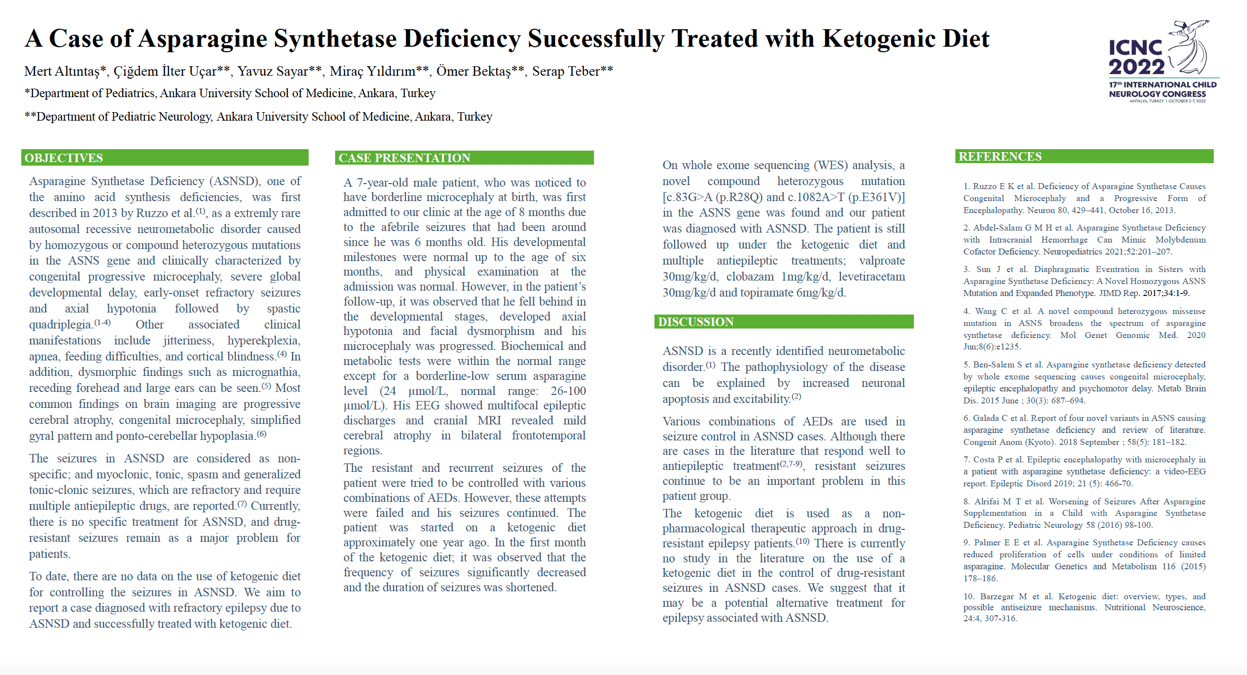A case of asparagine synthetase deficiency successfully treated with ketogenic diet
Mert Altıntaş, Çiğdem İlter Uçar, Ömer Bektaş, Yavuz Sayar, Miraç Yıldırım, Serap Teber
Objectives: Asparagine synthetase deficiency (ASNSD) is a recently defined metabolic disorder characterized by developmental delay, congenital microcephaly, and intractable seizures, caused by mutations in the ASNS gene. To date, there are no data on the use of the ketogenic diet in the control of seizures in ASNSD. We aimed to report a case diagnosed with refractory epilepsy due to ASNSD successfully treated with ketogenic diet. Case presentation: A 7-year-old boy was admitted to our unit at the age of six months with afebrile seizures. His developmental milestones were normal up to the age of six months. He developed axial hypotonia, cognitive decline, and microcephaly from the age of eight months. Biochemical and metabolic tests demonstrated mild low serum asparagine level (24 µmol/L, normal range: 26-100 µmol/L). Electroencephalography showed multifocal epileptic discharges and cranial MRI revealed mild cerebral atrophy in bilateral frontotemporal regions. Despite various combinations of antiseizure medications such as phenobarbital, levetiracetam, valproate, carbamazepine, topiramate, and clobazam, the seizures continued. A significant decrease was observed in the severity and frequency of seizures in the first month of the ketogenic diet. A novel compound heterozygous mutation [c.83 G>A (p.R28Q) and c.1082 A>T (p.E361V)] in the ASNS gene was found and confirmed by Sanger sequencing. Conclusion: Ketogenic diet was associated with marked improvement on intractable seizures in our case with ASNSD. We suggest that it may be a potential alternative treatment for epilepsy associated with ASNSD.
Keywords: Asparagine synthetase deficiency, refractory epilepsy, ketogenic diet
Mert Altıntaş
Ankara University School of Medicine
Turkey
Çiğdem İlter Uçar
Ankara University School of Medicine
Turkey
Ömer Bektaş
Ankara University School of Medicine
Turkey
Yavuz Sayar
Ankara University School of Medicine
Turkey
Miraç Yıldırım
Ankara University School of Medicine
Turkey
Serap Teber
Ankara University School of Medicine
Turkey
Objectives: Asparagine synthetase deficiency (ASNSD) is a recently defined metabolic disorder characterized by developmental delay, congenital microcephaly, and intractable seizures, caused by mutations in the ASNS gene. To date, there are no data on the use of the ketogenic diet in the control of seizures in ASNSD. We aimed to report a case diagnosed with refractory epilepsy due to ASNSD successfully treated with ketogenic diet. Case presentation: A 7-year-old boy was admitted to our unit at the age of six months with afebrile seizures. His developmental milestones were normal up to the age of six months. He developed axial hypotonia, cognitive decline, and microcephaly from the age of eight months. Biochemical and metabolic tests demonstrated mild low serum asparagine level (24 µmol/L, normal range: 26-100 µmol/L). Electroencephalography showed multifocal epileptic discharges and cranial MRI revealed mild cerebral atrophy in bilateral frontotemporal regions. Despite various combinations of antiseizure medications such as phenobarbital, levetiracetam, valproate, carbamazepine, topiramate, and clobazam, the seizures continued. A significant decrease was observed in the severity and frequency of seizures in the first month of the ketogenic diet. A novel compound heterozygous mutation [c.83 G>A (p.R28Q) and c.1082 A>T (p.E361V)] in the ASNS gene was found and confirmed by Sanger sequencing. Conclusion: Ketogenic diet was associated with marked improvement on intractable seizures in our case with ASNSD. We suggest that it may be a potential alternative treatment for epilepsy associated with ASNSD.
Keywords: Asparagine synthetase deficiency, refractory epilepsy, ketogenic diet
Mert Altıntaş
Ankara University School of Medicine
Turkey
Çiğdem İlter Uçar
Ankara University School of Medicine
Turkey
Ömer Bektaş
Ankara University School of Medicine
Turkey
Yavuz Sayar
Ankara University School of Medicine
Turkey
Miraç Yıldırım
Ankara University School of Medicine
Turkey
Serap Teber
Ankara University School of Medicine
Turkey

Mert Altıntaş
Ankara University School of Medicine Turkey
Ankara University School of Medicine Turkey